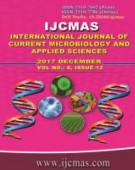


 National Academy of Agricultural Sciences (NAAS)
National Academy of Agricultural Sciences (NAAS)

|
PRINT ISSN : 2319-7692
Online ISSN : 2319-7706 Issues : 12 per year Publisher : Excellent Publishers Email : editorijcmas@gmail.com / submit@ijcmas.com Editor-in-chief: Dr.M.Prakash Index Copernicus ICV 2018: 95.39 NAAS RATING 2020: 5.38 |
Plastic has become an indispensable part of every sphere of human life due to its high quality, durability and inexpensiveness, etc. Hence, an innovative method of bioremediation should be adopted, that utilizes the potential of microbes in degrading such non-biodegradable plastics. Various chemical and biological approaches are involved in degradation of plastic, but from ecofriendly way biological approaches are in more common trend today, which involves use of microbes for hydro-biodegradation and oxo-biodegradation of the polymers following photo degradation and chemical degradation of the plastic. It has been found by previous researches that different groups of microbes including bacteria, fungi, actinomycetes etc have versatile property of degrading both natural and synthetic plastics by converting non-biodegradable plastics into low molecular weight polymers, CO2, water, biogases like methane and other less harmful components by modifying their crystalline level, molecular weight and mechanical properties that are responsible for their resistance towards easy degradation. This review mainly focused on new innovative ways to utilize microbial activity in reducing environmental pollution to a vast extent making this planet a safe home to live, and directly preventing the humans, animals, plants and soil from harmful consequences of plastic pollution.
 |
 |
 |
 |
 |